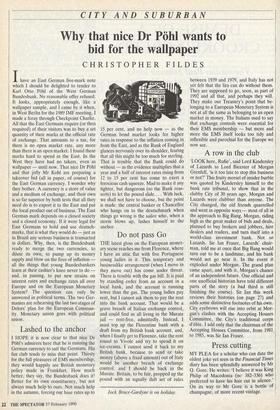CITY AND SUBURBAN
Why that nice Dr Pohl wants to bid for the wallpaper
CHRISTOPHER FILDES
Ihave an East German five-mark note which I should be delighted to tender to Karl Otto Pohl of the West German Bundesbank.. No reasonable offer refused. It looks, appropriately enough, like a wallpaper sample, and I came by it when, in West Berlin for the 1989 IMF meeting, I made a foray through Checkpoint Charlie. All that the East Germans require (or then required) of their visitors was to buy a set quantity of their marks at the official rate of exchange. That amounts to a tax, for there is no open market rate, any more than there is an open market. I found these marks hard to spend in the East. In the West they have had no takers, even as wallpaper — until now. That nice Dr POhl and that jolly Mr Kohl are preparing a takeover bid (all in paper, of course) for the East German currency. I wonder why they bother. A currency is a store of value and a medium of exchange, and their own is so far superior by both tests that all they need do is to export it to the East and put the local product out of business. The East German mark depends on a closed society and a closed economy. If it were legal for East Germans to hold and use deutsch- marks, that is what they would do — just as in Brazil any serious business is transacted in dollars. Why, then, is the Bundesbank ready to merge the two currencies, to dilute its own, to pump up its money supply and blow on the fires of inflation — all the things that young Bundesbankers learn at their cashier's knee never to do — and, in passing, to put new strains on interest rates and exchange rates all over Europe and on the European Monetary System? The question can only be answered in political terms. The two Ger- manies are rehearsing the last two stages of Delors' plan for the European Commun- ity. Monetary union goes with political union.


















































 Previous page
Previous page